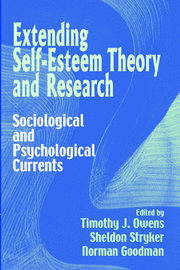Book contents
- Frontmatter
- Contents
- List of Contributors
- SECTION ONE THE FRAME
- SECTION TWO CONCEPTUAL AND METHODOLOGICAL ISSUES
- SECTION THREE SOCIAL AND LIFE COURSE CONTEXTS OF SELF-ESTEEM
- 7 Self-Esteem of Children and Adolescents
- 8 Failure of the Dream: Notes for a Research Program on Self-Esteem and Failed Identity in Adulthood
- 9 Self-Esteem and Work Across the Life Course
- 10 Comfort with the Self
- SECTION FOUR SELF-ESTEEM AND SOCIAL INEQUALITIES
- SECTION FIVE SELF-ESTEEM AND SOCIAL PROBLEMS
- Index
7 - Self-Esteem of Children and Adolescents
Published online by Cambridge University Press: 24 November 2009
- Frontmatter
- Contents
- List of Contributors
- SECTION ONE THE FRAME
- SECTION TWO CONCEPTUAL AND METHODOLOGICAL ISSUES
- SECTION THREE SOCIAL AND LIFE COURSE CONTEXTS OF SELF-ESTEEM
- 7 Self-Esteem of Children and Adolescents
- 8 Failure of the Dream: Notes for a Research Program on Self-Esteem and Failed Identity in Adulthood
- 9 Self-Esteem and Work Across the Life Course
- 10 Comfort with the Self
- SECTION FOUR SELF-ESTEEM AND SOCIAL INEQUALITIES
- SECTION FIVE SELF-ESTEEM AND SOCIAL PROBLEMS
- Index
Summary
The study of children's and adolescents' self-esteem is indebted to the pioneering social psychologist to whom this book is dedicated, Morris Rosenberg. Perhaps no one contributed more to our understanding of the dynamics, correlates, and consequences of children's self-concept. Rosenberg elucidated the mechanisms by which the evaluations of some referent others are more important than others in shaping self-concept, clarified the social contexts in which social comparisons operate, and demonstrated that self-concept is characterized by a complex hierarchical structure of traits, values, and identities, the psychological ordering and salience of which varies from one individual to the next. In this chapter, I briefly review and assess Rosenberg's lasting theoretical contributions to the field, summarize what we know and what we don't know about how children see themselves, and suggest important directions for extending and refining the study of children's self-concept.
Arguably, Rosenberg's most important contributions were theoretical, extending in valuable ways the seminal work of Charles Horton Cooley (1902) and George Herbert Mead (1934) and demonstrating that significant others are not equally significant in their impact on self-concept. Throughout a career spanning three decades of research on the structure and correlates of self-concept, Rosenberg carefully and systematically used theory to guide and explain the proximate social processes bearing on an individual's feelings and attitudes toward oneself. In conceptualizing, designing, and interpreting his research, he skillfully and rigorously applied, tested, and refined four theories of self-formation: reflected appraisals, social comparisons, self-perception, and psychological centrality.
Information
- Type
- Chapter
- Information
- Extending Self-Esteem Theory and ResearchSociological and Psychological Currents, pp. 135 - 156Publisher: Cambridge University PressPrint publication year: 2001
Accessibility standard: Unknown
Why this information is here
This section outlines the accessibility features of this content - including support for screen readers, full keyboard navigation and high-contrast display options. This may not be relevant for you.Accessibility Information
- 5
- Cited by
